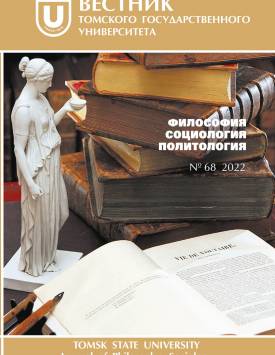When the future borders on utopia: Science in perspective
The relationship between the internal, cognitive-methodological and external, socio-institutional contours of science is characterized by uneven dynamics, misalignment of developmental phases and sometimes significant conflicts. Within the internal contour, this dissonance acts, in particular, as a distinction between tasks and problems. At the level of the external contour, this corresponds to the confrontation between the normal scientific community and the marginal precaria. The article puts forward a hypothesis about the source of both acceleration and inhibition of scientific research and acceptance by society of their results. It is seen, on the one hand, in the cognitive problematization of existing knowledge. The problem, unlike the problem, embodies the projective-constructive dimension of knowledge; it is a way of setting a possible future, a manifestation of creative freedom. On the other hand, the dynamics of science is determined by the competition of the institute of normal science and its social alternatives. At the same time, normal science is interpreted not just as the solution of particular problems, “solving puzzles” (T. Kuhn). It includes the socioinstitutional dimension: the “normal” distribution of roles and statuses in the scientific community; tenure's dominance over short-term projects and contracts, basic funding of universities and institutes before grants, scientific schools over temporary research groups. As a symbol of social alternatives to normal science is the scientific precariat. This is a group that is often identified with the marginalized, but in fact includes the social diversity of scientists who do not have tenure. In addition, in the vast majority of countries, scientists are forced to look for a part-time job in order to ensure a decent standard of living, which introduces them to the situation of precaria in the economic and sociological sense. At the same time, this contributes to the expansion of their horizons, ideological emancipation, mobility, readiness to solve both fundamental problems and applied problems, to be involved in the work of interdisciplinary research groups and social projects. Both the cognitive and social problematization of science contribute to scientific creativity and its external manifestation - the development of a free society. Such a perspective is initially given to science and society by the philosophical utopia of knowledge-as-power, which, under the guise of domination over minds, proclaims the desire for freedom. The author declares no conflicts of interests.
Keywords
creativity, historical epistemology, social epistemology, science, cognitive dissonanceAuthors
| Name | Organization | |
| Kasavin Ilya T. | Institute of Philosophy RAS; Nizhny Novgorod State University N.I. Lobachevsky; Inter-regional non-government organization Russian Society for History and Philosophy of Science | itkasavin@gmail.com |
References

When the future borders on utopia: Science in perspective | Tomsk State University Journal of Philosophy, Sociology and Political Science. 2022. № 68. DOI: 10.17223/1998863X/68/19
